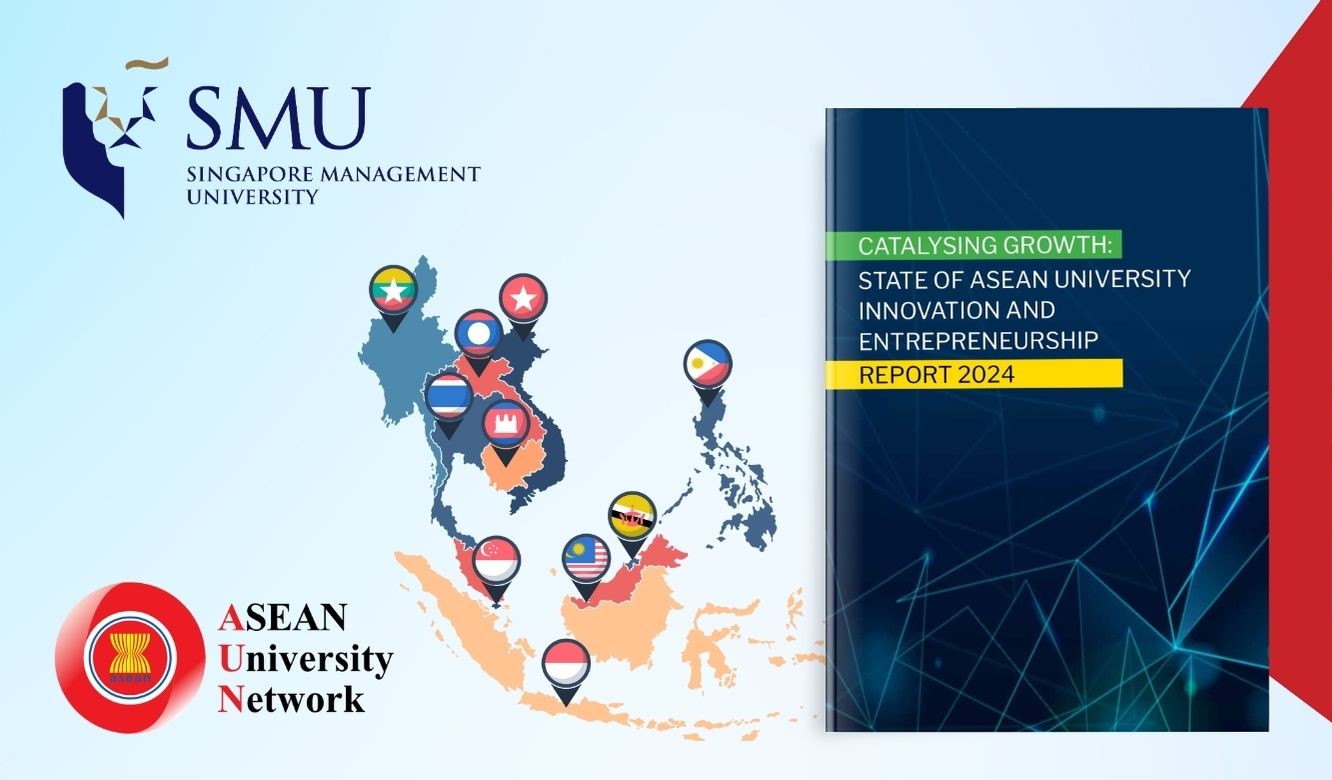
With Southeast Asia’s start-up economy projected to reach a valuation of US$1 trillion next year, universities have a role working with each other to foster the growth of innovation and entrepreneurship in the digital space.
This is the thrust of a white paper developed by SMU and Thailand’s Chulalongkorn University. The paper outlines key trends in the region’s innovation space, as well as the increasingly critical role of universities.
SMU and Chulalongkorn University are co-leaders of the ASEAN University Network - University Innovation and Enterprise Network (AUN-UIE), a consortium of 30 higher education institutions spearheading initiatives to drive regional innovation and entrepreneurship (I&E).
Titled “Catalysing Growth: State of ASEAN University Innovation and Entrepreneurship Report 2024”, the white paper was distributed at this year’s Singapore Week of Innovation and Technology (SWITCH), on 28 to 30 October 2024 at Marina bay Sands.
The white paper aims to foster dialogue and action, positioning AUN-UIE as a key stakeholder in Southeast Asia’s I&E landscape and lifting its impact beyond the university environment.
“Universities are naturally positioned to champion I&E in here in Southeast Asia, as the region is home to one of the world’s youngest yet most rapidly urbanising consumer base, where almost 1 in every 2 people are estimated to be youths under age 30,” said Professor Lim Sun Sun, Vice-President for Partnerships and Engagement at SMU. She is also Professor of Communication & Technology at SMU’s College of Integrative Studies.
The white paper had previously been launched by the SMU Bangkok Overseas Centre in July 2024. It explores the macroeconomic drivers behind Southeast Asia’s remarkable economic growth over the past few years, due to a combination of factors such as the region’s young demographic, rising incomes, urbanisation and infrastructure development.
This growth has led to the expansion of its middle-class consumer base that is both actively participating and benefitting from the region’s rapidly expanding digital economy, which has surged from US$12 billion to US$100 billion in 2023, an eightfold increase.
In such a climate, there is tremendous potential for Innovation and Entrepreneurship (I&E) space to be a critical economic driver.
Concurrently, 80 per cent of the current regional workforce is employed informally at platform start-ups or digital-first enterprises – something which highlights the need for entrepreneurs to master the integration of technology in business and sustainable digital scalability.
Local governments have also recognised the value in the startup ecosystem, displayed by their investment in long-term initiatives. Given this growth trajectory, the region’s youth represent a key resource for future I&E growth.
I&E forward graduates needed for long-term sustainable growth
Some of the most impactful Southeast Asian start-up enterprises like Grab, Gojek and Ajaib were established shortly after their founders completed their tertiary education.
On top of this, the region’s workforce is expected to grow by 24 million people in 2030, making it vital that they are equipped to meet the needs of the start-up ecosystem.
Within this climate, the paper highlights that universities play a pivotal role in championing I&E, as they provide the nesting ground for entrepreneurial talent during their formative years.
Through academic programmes, student-led initiatives and more, universities can help to nurture future talent.
At the same time, universities can foster collaboration between industry, government and private sector partners, which helps to facilitate investments, knowledge sharing and strategic partnerships.
The paper also mentions how universities have reported increased involvement in helping student leaders realise their start-up ideas, primarily through incubation programmes and collaborations between academic, government, and private sector partners.
For example, SMU’s Institute of Innovation and Entrepreneurship (IIE) has nurtured more than 600 start-ups through its Business Innovations Generator (BIG) incubation programme, having raised S$613 million since its establishment. In addition, the Lee Kuan Yew Global Business Plan Competition is a biennial university start-up competition that draws top university talent from across the globe, strengthening Singapore’s position as a key hub for positive I&E impact in the region.
To drive I&E, universities find it necessary to tap into the synergies within the AUN-UIE to ensure universities are well-positioned to contribute to the ecosystem.
The AUN-UIE proposed focusing on five potential areas of collaboration, namely Data Management, Technology Commercialisation, Funding, Internationalisation and Mentorship. It also noted the need to create a regional university-led platform that can offer funding, mentorship, and resources for aspiring entrepreneurs. Other collaborations could include hosting job boards, organising webinars, and creating a platform for sharing tech commercialisation best practices.
Said Prof Lim, “In a region with a diversity of cultures, languages, and regulatory environments, regional networks such as AUN-UIE can drive efforts for entrepreneurs, investors, and stakeholders to come together, share insights, and catalyse innovation.”


